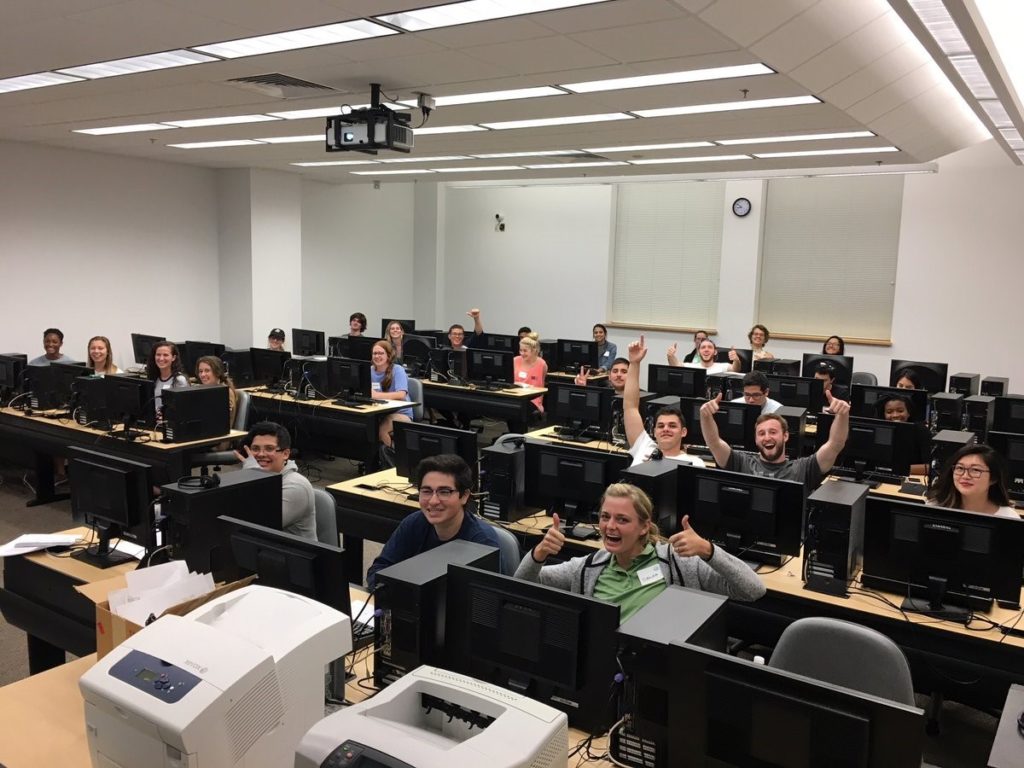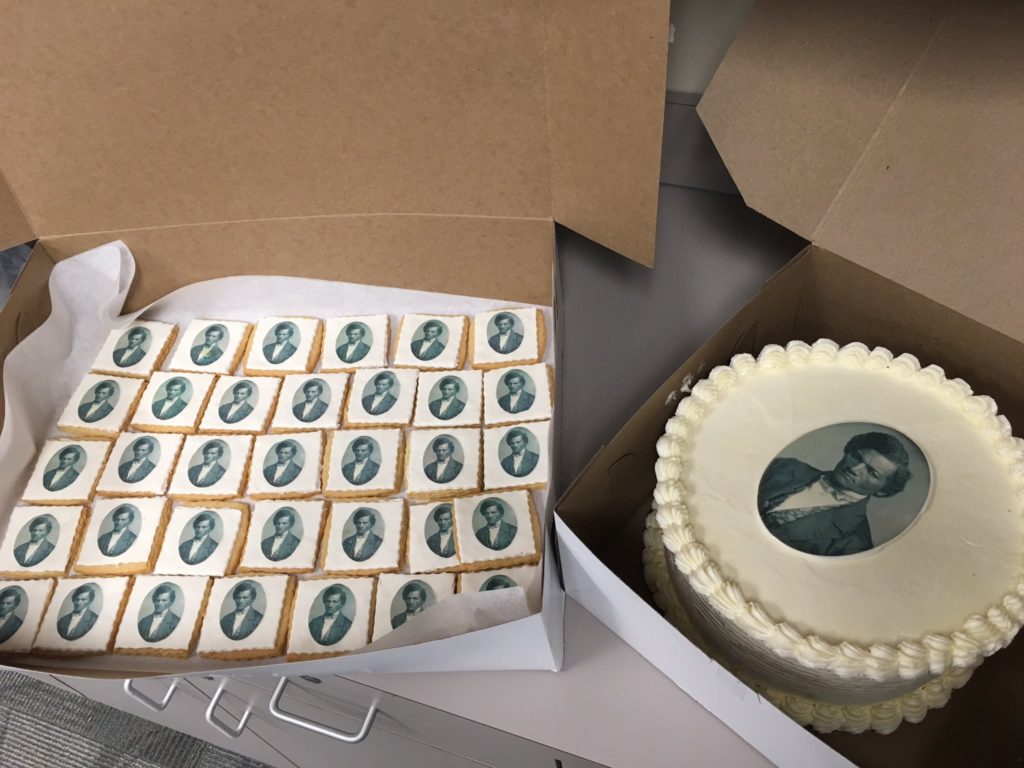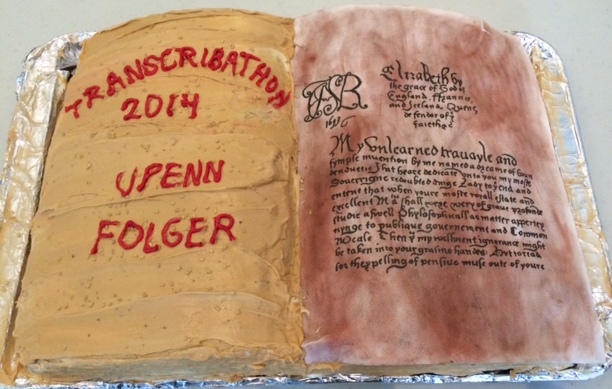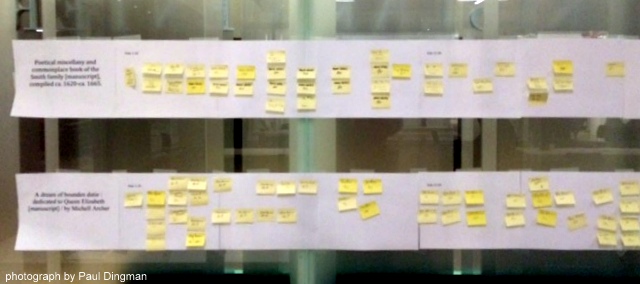
What's a transcribathon? In the words of Paul Dingman of the Folger Shakespeare Library, on the very first transcribathon in 2014: “Transcribathon, an event running from noon to midnight in which we transcribe and encode manuscripts..." Your transcribathon doesn't have be a 12 hour long marathon, but we've gathered a list of ideas from other transcribathons that will help make your event a success.
1) Make it an event!
Just take a look at this agenda for the 2018 Douglass Day transcribathon -- cake, a blessing, singing, a playlist, a history lecture, how-tos, a dance performance and did we mention cake?
While that might be more than most would want to put together, a smaller event could include a guest speaker, like the Ada Lovelace day transcribathon:
"The session was three hours, including a guest speaker talking about women in science, so about two and a half hours of learning and doing Wikisource, which participants said felt exactly the right length."
2) Use social media.
It might seem odd to use social media if you are having an in-person transcribathon, but as Amy Powis says in her wrap-up as a volunteer on the transcribathon for the Early Modern Recipe Online Collective, it's useful even for volunteers sitting in the same room: "As I started transcribing, I noticed there would be a social media aspect that made the Transcribathon enjoyable, as I could find others completing it through #Transcribathon. This was almost comforting knowing that other people were also having trouble with the recipes, which made the independent project feel that you were not alone, which was weird considering I was in a room with other people. It was also quite nice, as I got a few helpful tips through the hashtag. "
Abby Burnett was a remote volunteer in the same transcribathon, and appreciated the community building that social media gave the project: "On Twitter and Facebook EMROC was available to offer support and encouragement, and the hashtag #transcribathon was in full effect as virtual transcribers got involved with those on site. This modern edge to history really added to the experience as it gave solitary transcribers like me an insight of how collaborative and special this event was, I felt like I was part of something unique."
WeDigBio reports that "During the event, hosts and participants share their experiences via social media, with Twitter being the most popular platform. Tweets and photos allowed the online public to follow along on behind-the-scenes tours of collections, see images of beautiful specimens, participate in challenges to find spooky words (“cemetery” was found in dozens of Florida plant specimen labels!), share unusual label text (e.g., a collection locality described as “A drinking community with a golfing problem”), and announce achievements such as projects getting completed (which we’re happy to report happened numerous times!)."
3) Serve snacks. (Cake seems popular.)
 Cookies and cake from the Douglass Day transcribathon.
Cookies and cake from the Douglass Day transcribathon.
 A cake prepared by Laura Aydelotte for the UPenn/Folger transcribathon.
A cake prepared by Laura Aydelotte for the UPenn/Folger transcribathon.
4) Keep tallies.
Keep tallies -- of volunteers, of pages transcribed and reviewed, of anything else you can think of. Tweet them out over the course of your transcribathon, and include them in a wrap-up post.
The first Folger/Penn transcribathon had volunteers write each page they completed on a post-it note and stick it on a long poster on the wall of the room.
5) Plan a follow-up.
Plan a follow-up -- and advertise it at the current event. Or, encourage your transcribers to keep working on their own. Send a newsletter out a week after the transcribathon with final tallies, photos, and encouragement to do more. For instance, WeDigBio researchers "report in BioScience that participants stayed engaged long after the initial event was over. Since these online platforms can be accessed anytime from anywhere, this heightened engagement provided ongoing assistance to the massive task of collection digitization."
6) Partner.

You can magnify your publicity efforts and social media exposure, not to mention raise volunteer's sense of significance and excitement, by joining other related projects or institutions to host a multi-site or multi-project transcribathon.
For instance, WeDigBio is a four day event to transcribe biological collections at institutions across 5 countries and 14 states.
The recent Douglass Day partnered with the Smithsonian Transcription Center to transcribe Freedman's Bureau records. The multi-site event included 64 different institutions hosting transcribathons!
7) Pick your material.
Find engaging material that would be good for a first time transcription experience. Assign out work. The organizer of the Women in Science Oxford Transcribathon "handed out post-it notes with page numbers on, and... set up a URL-shortener so that we could rapidly get to the transcriptions"
8) Pick the right day.
An auspicious day can help rally volunteers. Sometimes that day is the one right before a conference in your field starts. Others tie to a national holiday or the anniversary of an event. The annual Douglass Day event is always on Valentines Day, Frederick Douglass's chosen birthday.
9) Bring the physical document with you for show-and-tell.
"The best part of the day, though, was when Dr. Heather Wolfe, the manuscript curator at the Folger, brought the Winche manuscript into the room. To see in-person the very pages we spent the entire day transcribing digitally was a surreal experience; we all gathered around the manuscript, asking questions and finding the pages that we had already transcribed."
10) Give credit!
The Early Modern Recipes Online Collaborative touts credit as one of the benefits of participating in a transcribathon: "Along the way, participants will virtually meet scholars from around the world and emerge from the day with a line for their CV—all from their own home, classroom, or office! NO EXPERIENCE NECESSARY – we’ll walk you through the coding and offer pointers on the handwriting."
If you're producing a digital or print edition from the transcription, figure out how you'll credit the transcribers; make sure they know you'll credit them and how much you appreciate their work.
Interested in hosting a transcribathon? Contact Sara (saracarl@fromthepage.com) to find out how you can use FromThePage for transcribathons.
